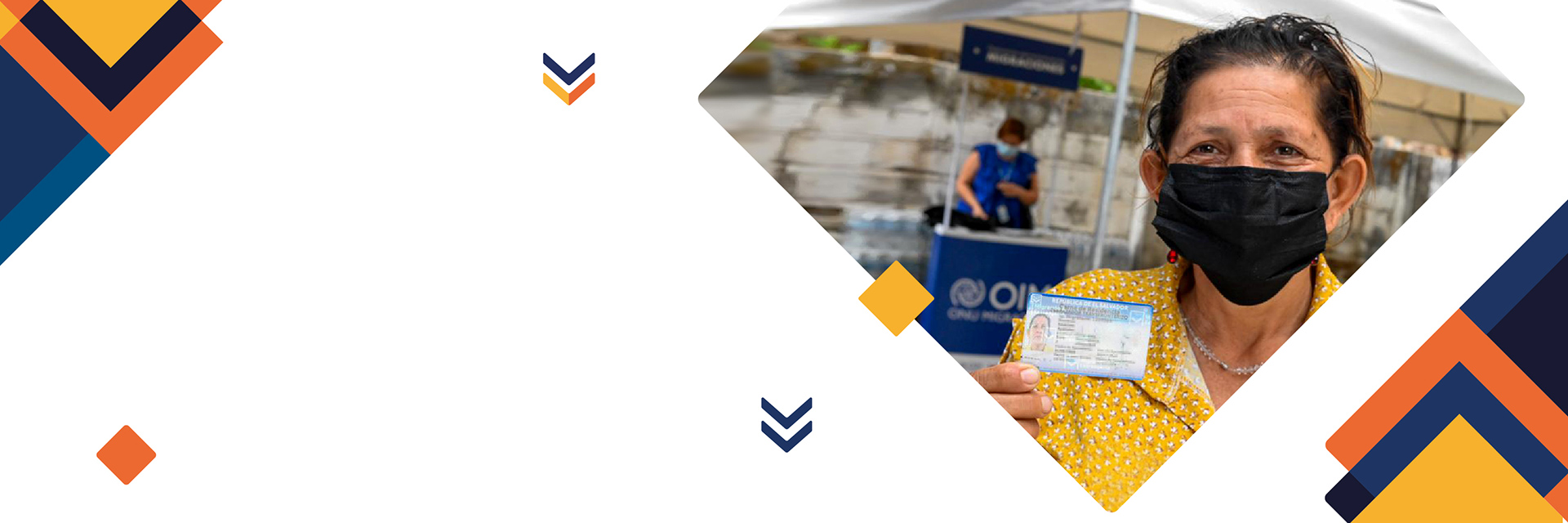Migration policy and governance refer to the "combined frameworks of legal norms, laws and regulations, policies and traditions as well as organizational structures (subnational, national, regional and international) and the relevant processes that shape and regulate States’ approaches with regard to migration in all its forms, addressing rights and responsibilities and promoting international cooperation" (IOM, 2019).
Countries often have migration governance frameworks, most of which focus on emigration and immigration aspects. This represents an opportunity to improve migration governance for governments to adopt policies that address all dimensions or domains of international migration in a holistic and comprehensive manner and contribute to sustainable development.
IOM has extensive experience in promoting policy coherence, capacity development and supporting the formulation of comprehensive and evidence-based migration policies (including legislation as well as regulatory and institutional frameworks). IOM bases its cooperation with governments on global frameworks, such as:
- 2030 Agenda and Sustainable Development Goals (SDGs)
- Global Compact for Safe, Orderly and Regular Migration (GCM).
- Migration Governance Framework (MiGOF).
IOM, as the main United Nations agency on migration, and coordinator and secretariat of the United Nations Migration Network, has a fundamental role in promoting compliance with the objectives of the GCM and in guiding and inspiring the design of migration policies based on the principles and approaches of the Compact: the pan-social and pangubermantal approach.
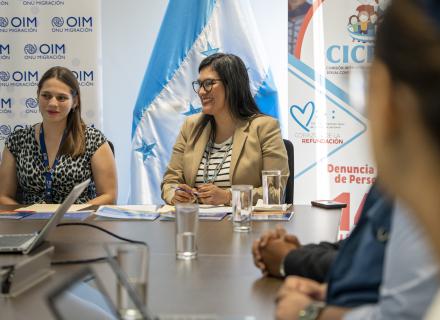
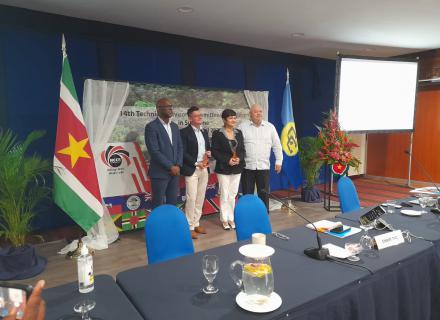
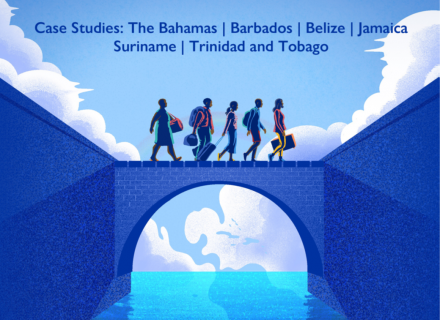
Invisible Movements: Recommendations for Facilitating the Movement of Persons with diverse Sexual Orientations, Gender Identities, Gender Expressions and Sex Characteristics in the Caribbean
In 2020, there were approximately 281 million international migrants in the world, representing 3.7 per cent of the global population. Moreover, migrants who belong to historically marginalized groups are often at risk of discrimination, stigmatization, violence, or difficulty accessing assistance when mobilizing across country borders, especially when they have an irregular immigration status. Persons of the Lesbian, Gay, Bisexual, Transgender, Queer, and Intersex (LGBTQI+) community in the Americas and the Caribbean are an example of such a group that can face obstacles to their regular and humane migration conditions. Therefore, IOM conducted this study to examine the situation of cross-border movement within the region among members of the LGBTQI+ community. This study focuses on the policies and legislation affecting the cross-border mobility and migration of persons with diverse sexual orientations, gender identity and expression, and sex characteristics (SOGIESC) in the Caribbean. Using a human rights approach based on principles enshrined in regional and international instruments, it analyses specific case studies in different countries to provide examples of good practices, limitations, and opportunities for improvement.
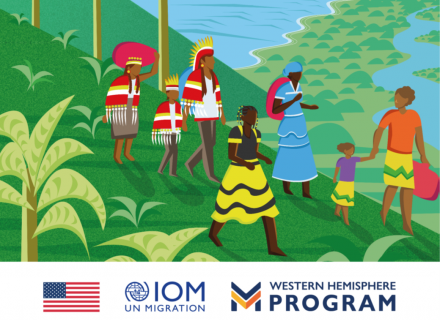
Invisible Movements: Recommendation for Facilitating the Cross-Border Migration of Indigenous Peoples in the Caribbean
In 2020, there were approximately 281 million international migrants in the world, representing 3.7 per cent of the global population. Moreover, migrants who belong to historically marginalized groups are often at risk of discrimination, stigmatization, violence, or difficulty accessing assistance when mobilizing across country borders, especially when they have an irregular immigration status. Indigenous populations in the Americas and the Caribbean are an example of such a group that faces obstacles to their regular and humane migration conditions. Therefore, IOM conducted this study to examine the situation of cross-border movement within the region among indigenous peoples. This study focuses on the policies and legislation affecting the cross-border mobility and migration of indigenous peoples in the Caribbean. Using a human rights approach based on principles enshrined in regional and international instruments, it analyses specific case studies in different countries to provide examples of good practices, limitations, and opportunities for improvement.
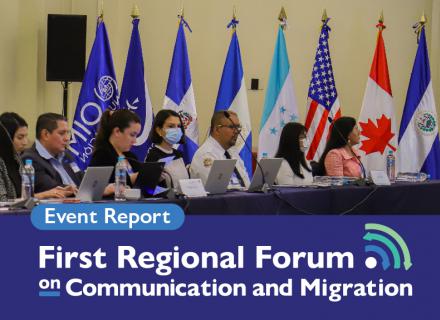
Event Report: First Regional Forum on Communication and Migration
The International Organization for Migration (IOM), in coordination with the Pro-Tempore Presidency (PPT) of the Regional Conference on Migration (RCM) and the Working Group on Irregular and Mass Migration held the First Regional Forum on Communication and Migration in order to highlight the strategic role of communication in the management of migration and compliance with the GCM.
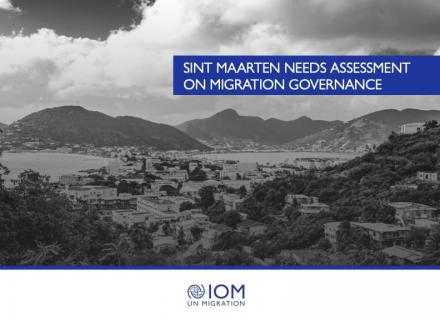
Sint Maarten Needs Assessment on Migration Governance
The Migration Governance Needs Assessment seeks to provide available information, offering a panoramic view of migration governance in Sint Maarten, including information about the successes and challenges in the establishment of a comprehensive migration policy and incorporating the perspective of the private sector and civil society. The report was developed in an accessible format that provides data on the structures and policies regulating migration governance and that identifies priorities for strengthening government capacity to manage migration effectively.
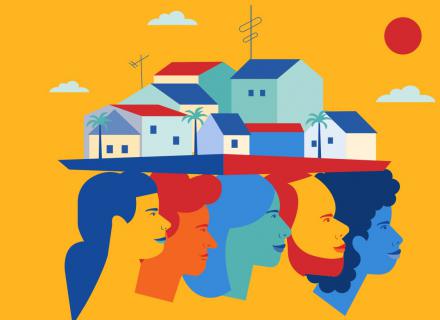
Finding Safer Ground: Planned Relocation Policies and Processes in The Caribbean
This research aims to expand the conversation about planned relocation and to focus specifically on Caribbean experiences. This report draws on good practices in order to provide tools for decision-making and to support States in addressing the needs of persons and communities that are vulnerable to the impacts of climate change. This study highlights opportunities to create more holistic and effective migration and disaster risk reduction policies and draws from interviews not only with government officials but also with community members who experienced the relocation, a critical perspective for understanding how relocations are planned and implemented.
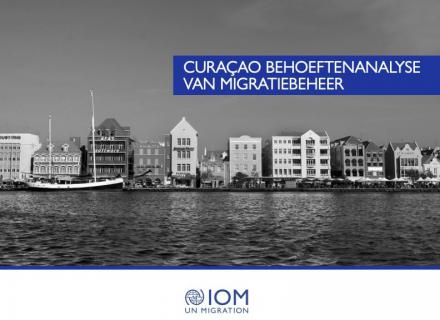
Curaçao behoeftenanalyse van migratiebeheer
Deze Migration Governance Needs Assessment (Behoefteanalyse van Migratiebeheer) geeft een panoramisch beeld weer van migratiebeheer in Curaçao. Door middel van concreet onderzoeksdata, in combinatie met de input van regionale belanghebbenden, biedt het een breder perspectief op mogelijkheden om migratiebeheer in het land te versterken. Daarnaast biedt het uitvoerbare aanbevelingen voor het minimaliseren van de potentiële risico's, en tegelijkertijd het maximaliseren van de economische en ontwikkelingsvoordelen, van migratie. Het onderzoek concentreert zich op de volgende zes hoofdthema's: migratiebeleid en internationale normen, migratie en grensbeheer, migratie in de context van noodsituaties en rampen, migranten bescherming en bijstand, migratie en gezondheid, en arbeidsmigratie en menselijke ontwikkeling.
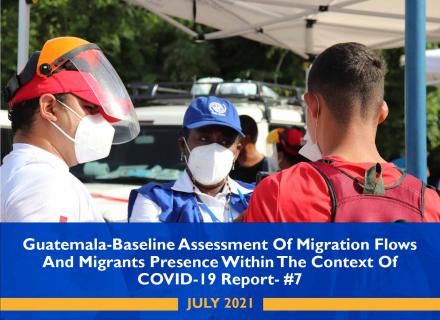
Guatemala-Baseline Assessment Of Migration Flows And Migrants Presence Within The Context Of COVID-19 Report- #7 (July, 2021)
According to key informants, most migrants in transit through Guatemala enter the country through blind crossings at the borders of El Corinto in Izabal, and El Florido and Agua Caliente located in Chiquimula, in small mixed groups of various age groups. These persons transit in an irregular condition, evading migration control posts established by the Guatemalan Government at these borders, which consist of the review of personal identification and proof of the COVID-19 test.
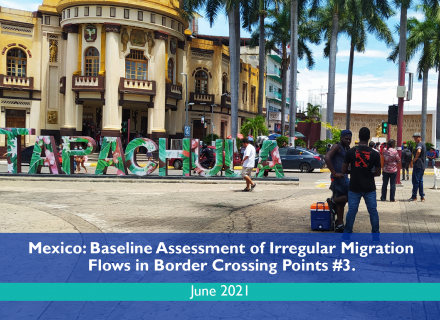
Mexico-Baseline Assessment Of Irregular Migration Flows And Mobility Monitoring In Border Crossing Points Within The Context Of COVID-19 #3 (July, 2021)
The DTM (Displacement Tracking Matrix), through the sub-components ow monitoring and mobility tracking, is a methodology whose purpose is to quantify and analyze trends in migration ows and the presence of migrants in specic locations during a specic period. Data were collected from interviews with strategically selected key informants, which were carried out remotely.
